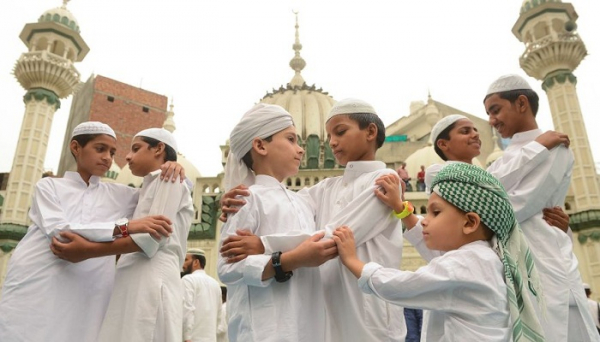
History
According to Muslim tradition, Eid al-Fitr was originated by the Islamic prophet Muhammad.[12] According to certain traditions, these festivals were initiated in Medina after the migration of Muhammad from Mecca. Anas, a well-known companion of the Islamic prophet, narrated that, when Muhammad arrived in Medina, he found people celebrating two specific days in which they entertained themselves with recreation and merriment. At this, Muhammad remarked that God had fixed two mandatory days of festivity: Eid al-Fitr and Eid al-Adha.[13]
General rituals
Eid al-Fitr begins at sunset on the night of the first sighting of the crescent moon. The night on which the moon is sighted is celebrated as Chand Raat. If the moon is not observed immediately after the 29th day of the previous lunar month (either because clouds block its view or because the western sky is still too bright when the moon sets), then the holiday is celebrated the following day.[14] Eid al-Fitr is celebrated for one to three days, depending on the country.[15] It is forbidden to fast on the Day of Eid, and a specific prayer is nominated for this day.[16] As an obligatory act of charity, money is paid to the poor and the needy (Zakat-ul-fitr) before performing the ‘Eid prayer.[17]
Eid prayer and eidgah
Further information: Eid prayers and Eidgah
The Eid prayer is performed by the congregation in an open area such as a field, community center, or mosque.[15] No call to prayer is given for this Eid prayer, and it consists of only two units of prayer, with a variable amount of Takbirs and other prayer elements depending on the branch of Islam observed. The Eid prayer is followed by the sermon and then a supplication asking for God’s forgiveness, mercy, peace and blessings for all living beings across the world. The sermon also instructs Muslims as to the performance of rituals of Eid, such as the zakat.[18] The sermon of Eid takes place after the Eid prayer, unlike Friday prayer which comes first before prayer. Some imams believe that listening to the sermon at Eid is optional.[19] After the prayers, Muslims visit their relatives, friends, and acquaintances or hold large communal celebrations in homes, community centers, or rented halls.[15]
 Associated with Brain Craft Ltd.
Associated with Brain Craft Ltd.
